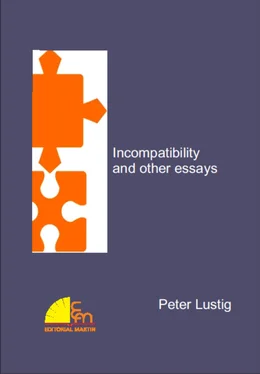Quite apart from the question as to why so many successful politicians should have a past that was not precisely law-abiding, one ought to ask whether the reason might not lie with the discriminatory view in which the less affluent sector of society is held, in a “liberal” context, and whether this ought not to be attributed to too many people having been left out, basically because they did not fit the cultural bias that accorded an identity only to those who met the institutionally prescribed standards, socially and ideologically. Divided societies are always ripe for dissent: the worst form of dissent appears in the guise of religious conflict. Why? Because there is no way to reason around belief; so it becomes impossible to temporize. This was why the clergy were gradually disempowered in the West. No such disempowerment has taken place in the Muslim society (nor among the Zionists, or the Peronists, or the Congress Party, just to mention a few well known examples of single track thought models). In some respects, these constitute a solid majority bloc that is unlikely to give way to any sort of opposition. If some of the more damaging economic consequences of political reliance on state sponsored investment are surveyed, one could hardly expect that a rational electorate would endorse such a system. But that is how the vote tends to go. So, inevitably, one must conclude that more people stand to gain by depending on the state, either through participating in government, or benefiting from perks.
The ordinary voter does not take the long view of an economic trend, because a) he is faced by urgencies closer at hand and b) he is skeptical about the future, quite apart from whether he has a grasp of economics or is completely ignorant in that department, as is often the case. There are even members of the entrepreneurial class who ought to know better; but their thinking does not go beyond the returns of the balance sheet, at the end of the fiscal year. It cannot be said that they are ignorant; but they have other priorities than the long term outlook of the economy.
Supposing one were to piece together the economic plunge of regimes like those of Cuba and Venezuela with the collapse of the Soviet Union, it is hard to understand how anybody could expect a policy of redistribution to hold up in the absence of investment, after all the haves had been fleeced dry or done in. That was what Stalin and Hitler did. They differed mainly in that Hitler lost the war. In addition to the very similar social discipline put into practice by sundry totalitarian regimes, to prepare for war, there is very little difference, if any, between what needed to be done after the collapse of their economies. That should speak for itself when it comes to evaluating state sponsored capitalism. In every case, after the resources taken over from the more affluent (or more helpless) sector of local society gave out, it became necessary to embark on wars of conquest, which mostly ended badly, as a logical outcome of unequal military and economic capabilities.
Was this something the leaders of the different regimes did not know or could not foresee? Of course not. They just decided to take their chances when the time was right, particularly because they could rely on the support of their infatuated populations that had been geared to the highest pitch of enthusiasm. One would have to have lived through the phase of nationalistic exaltation to realize how irrationally people can behave. Not only because of the blinding and intimidating effect of propaganda and the subtleties of the police state. The whole idea of the nation state, as preparatory for mobilization, leaves ordinary folks at the mercy of their loyalties: patriotism or religion, whichever should take priority in one society or another. The question is: how can this be dealt with and what can be done about defusing the danger of self-destruct?
Closest to the well-being of a society hampered by inequality lies the problem of deciding how far the encroachment of the government upon private incomes can go. This has nothing to do with jockeying for advantage in a parliamentary debate. The question is: when will the economy have reached the point of no return in the transfer of resources to the poor? It should be discernible when the first signs of a recession appear. That does not mean that there is a crisis in the offing, yet. But it ought to turn on a warning light. As a rule, the way in which a downturn in the economy is evaluated and acted upon reveals the difference between responsible management and otherwise. As soon as the inadequacy of a currency rating goes out of control, a major crisis may be under way. It would depend on how seriously concerned a government might wish to admit that it felt on such slippery ground and whether it was prepared to do anything about it, before the realization were to sink in that there was downright incompatibility between increasing expenditure and indebtedness and making a serious effort to balance the budget. What happens, then? A pendulum swing across the political board takes place and, for a time, everything goes according to the book, until there is a surplus to distribute, once again, and another round of over-spending begins. This cannot happen where the political pendulum does not readily swing back and forth and there is a rigid commitment to policy, based upon loyalty to a leader, or a regime, that can be expected to resort to pressure tactics, when it would be advisable to work out a method to make sure the resources will be there to carry out a specific program A declaration of incompatibility will be of no help. Neither will the arbitrariness of “strong”government. At best, one can expect a waiting game before a showdown; but it could not last indefinitely.
V.The Turning Point of Historical Studies
From a very broad perspective, it is fair to assume that society (at least European society) began to evolve from a parochial or sectarian network into one of more far reaching loyalties, such as these expressed in terms of national appurtenance. This process began in the XVII century, most probably as an outcome of rationalism having gained the upperhand over dogmatism, thus undermining the influence of the clergy. The implication was that it might be more fruitful to use heads to think than to have them lopped off on the chopping block, just because some differences had gotten in the way of deciding about dynastic transitions, if loyalties could be transferred from the feudal lord to the nation state. Has any serious consideration ever been given to establishing why recourse to eliminate opposition should take precedence over other methods in addressing public issues, other than by referring to increased sensibility or greater squeamishness, nowadays?
Thinking led to the updating of the image of society. There were more people in the, as yet, unrepresented middle sectors than among the nobles. As it were, since the subdued underclass had nothing to contribute, it was not expected to have anything to say for itself.
However, factional strife had steadily encouraged fortune-seeking, ever since the Crusades. Marauding adventurers were still prospering as recently as the Thirty Years War. The stakes were heavily in favour of wealthy war lords affiliated with opposing religious factions, designed to provide opportunities for advancement for their supporters, who remained as unqualifiedly dependent on their overlords for protection as they had always been, under feudalism.
As a result of a numerical increase in the following and a corresponding decline in the possibility of meeting the expectations of these followers, political representation laid out along the lines of rationalism presented a practical alternative to conspiracies and regional strife, within what would be regarded as national boundaries, in the XIX century. It was a well-known fact of life that young men who were left without inheritance, due to the rule of primogeniture, would happily enlist with what were actually mercenary armies, organized by powerful landed gentry of unlimited ambition, to broaden their domains in locations, far or near, but not necessarily connected by links of ancestry, language, religion, etc. Thus, the precursor of German national identity, Wallenstein, was murdered by an Irish soldier of fortune, not for any ideological or political reason, but just for money. The fact that Wallenstein owes most of his fame to Schiller, who pictured him as a Germanic hero, does not reckon with his having been neither German, but Czech, nor German speaking. However, that was how cultural affiliation was defined, in accordance with feudal subservience, instead of harping on any shared traditions.
Читать дальше












